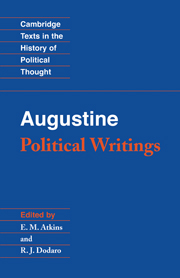Book contents
- Frontmatter
- Contents
- Editors' note
- Introduction
- Translator's notes
- Principal dates
- Bibliography
- Map of Augustine's north Africa
- CHRISTIANITY AND CITIZENSHIP
- BISHOPS AND CIVIL AUTHORITIES
- JUDICIAL AUTHORITY
- THE DONATIST CONTROVERSY
- WAR AND PEACE
- Biographical notes
- Notes to the text
- Index of persons and places
- Index of topics
- Cambridge Texts in the History of Political Thought
BISHOPS AND CIVIL AUTHORITIES
Published online by Cambridge University Press: 05 June 2012
- Frontmatter
- Contents
- Editors' note
- Introduction
- Translator's notes
- Principal dates
- Bibliography
- Map of Augustine's north Africa
- CHRISTIANITY AND CITIZENSHIP
- BISHOPS AND CIVIL AUTHORITIES
- JUDICIAL AUTHORITY
- THE DONATIST CONTROVERSY
- WAR AND PEACE
- Biographical notes
- Notes to the text
- Index of persons and places
- Index of topics
- Cambridge Texts in the History of Political Thought
Summary
Letters 133, 134 and 139
In the following set of letters Augustine writes to Apringius, proconsul of Africa, and to his brother Marcellinus, urging mercy for the Donatists who have been convicted of the murder and mutilation respectively of two Catholic priests.
Letter 133
Augustine the bishop greets in the Lord his distinguished and deservedly notable lord and beloved son Marcellinus.
(1) I have been informed that the Circumcellions and clergy of Donatus' sect who were taken from the diocese of Hippo by those responsible for public order to stand trial for their activities have in fact been heard by your noble self. Most of them have confessed to committing the murder of Restitutus, the Catholic priest, and to beating Innocent, another Catholic priest, and to gouging out the latter's eye and cutting off his finger. Consequently, I am deeply stricken by the worry that your exalted self might decide to have them punished so harshly by law that the sufferings they will endure correspond to those they have inflicted. I write, therefore, to beg you by the faith you have in Christ, through the mercy of our Lord Christ himself, neither to do this yourself nor to allow it to be done at all.
Now it might be possible for us to turn a blind eye to their deaths, when they were clearly not summoned to trial because we accused them; rather, those responsible for keeping an eye on the preservation of public peace indicted them.
- Type
- Chapter
- Information
- Augustine: Political Writings , pp. 61 - 100Publisher: Cambridge University PressPrint publication year: 2001
- 1
- Cited by



